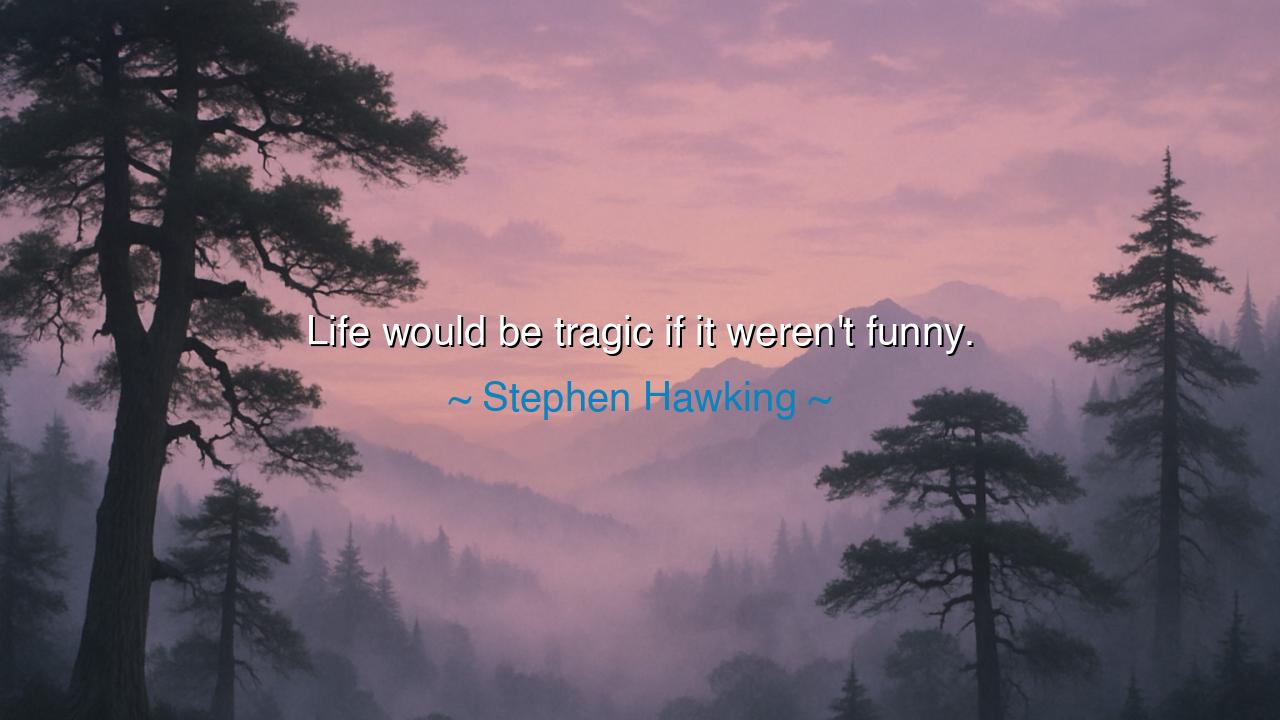
Life would be tragic if it weren't funny.






“Life would be tragic if it weren’t funny.” Thus spoke Stephen Hawking, the great mind who gazed into the infinite and yet found humor in the frailty of human existence. These words, born from a man who knew both the vastness of the cosmos and the limits of the flesh, are not merely a clever saying — they are a philosophy of survival. Beneath their gentle wit lies a profound truth: that humor is the soul’s rebellion against despair, the light that endures when everything else fades.
Hawking, bound by the stillness of his body and yet soaring through the endless reaches of space in thought, understood that tragedy is inseparable from life. Illness, loss, failure — these are the conditions of being human. But to face them without laughter is to drown in sorrow. He learned that laughter is strength disguised as joy, that when one cannot control fate, one can at least control one’s response to it. Thus, through wit and irony, he triumphed where others might have broken. His humor was not denial of pain, but mastery over it — a declaration that even in the face of mortality, the human spirit will smile.
The ancients, too, spoke of this power. The philosopher Epictetus, once a slave and later a Stoic sage, taught that while man cannot always choose his circumstances, he can choose his attitude. “It is not what happens to you, but how you react to it that matters,” he said — words that echo Hawking’s creed. For both men, laughter is the noblest form of defiance, the quiet laughter of the soul that whispers, “You may bind my body, but you will not conquer my mind.” To laugh at life’s tragedy is to strip it of its tyranny, to remind the darkness that it has no authority over your joy.
Consider the story of Viktor Frankl, the psychiatrist who endured the horrors of the concentration camps during the Second World War. Surrounded by suffering beyond measure, he found that even in the depths of despair, the spirit could find a reason to endure — sometimes through the smallest flicker of humor. He wrote of how prisoners would laugh quietly at the absurdities of their captors, at the ironies of fate. That laughter, he said, was not mockery, but resistance — proof that man’s inner freedom could not be extinguished. Hawking’s words spring from that same eternal wisdom: that laughter is the bridge between pain and purpose, the final freedom of the heart.
Yet Hawking’s insight carries another layer — one cosmic in scope. He spent his life exploring the paradox of existence: that we are fragile, temporary creatures adrift in an infinite universe that seems indifferent to us. Against such vastness, life could indeed seem tragic, even absurd. But through humor, Hawking found a way to make peace with that absurdity. To him, the universe was not a cold void, but a grand, ironic comedy. Our struggles, our loves, our brief flicker of existence — all of it becomes bearable when we learn to laugh at our smallness. For in laughter, we transcend it. In humor, we find humility and grace.
The origin of his quote lies in his lived experience — a man trapped within a body that betrayed him, yet who dared to look upon the stars. When he was diagnosed with ALS at twenty-one, he was told he would not live long. Yet he lived for decades, working, creating, teaching, and laughing. Humor became his way of staying human amidst the machinery that sustained him. He once joked, “I have noticed that even people who claim everything is predetermined still look before they cross the road.” Such humor was not flippant; it was his shield against despair, his way of showing that intellect without joy is hollow, and that joy without humor cannot survive the storms of life.
Therefore, my friend, take this as a sacred teaching: find the laughter hidden within your suffering. Do not deny the tragedy of life — see it clearly, but refuse to be consumed by it. When the weight of the world presses upon you, when fate seems cruel and unfair, remember that your laughter is not weakness but wisdom. It is the flame that cannot be extinguished, the music that continues even when the instruments break. Laugh not in mockery, but in understanding — for laughter is the language of those who see truth and still choose hope.
And so, let this be your practice: when hardship comes, seek the humor within it. When sorrow visits, allow yourself to smile. Not because the pain is small, but because your spirit is vast. For as Stephen Hawking reminds us, life would indeed be tragic if it weren’t funny — but laughter transforms tragedy into meaning, weakness into resilience, and mortality into magnificence. In that laughter lies the essence of what it means to be human: fragile in body, eternal in spirit, and forever capable of joy.






AAdministratorAdministrator
Welcome, honored guests. Please leave a comment, we will respond soon